Celebrating Triumphs and Recognizing History: What Asian American and Pacific Islander Heritage Month Means to La Salle Students
Senior Danny Nguyen is a co-president of the Asian American and Pacific Islander Club at La Salle.
May 19, 2021
Many kids want to grow up to pursue a variety of unequivocally “cool” jobs, such as doctors, veterinarians, or astronauts. Young children often have large-scale aspirations, with the sentence “When I grow up, I want to be…” ending in something like an NBA player, or a racecar driver, or a movie star.
But for senior Danny Nguyen, when he was a kid, what he wanted to be was white.
“I think I remember when I was seven years old, my biggest dream was to one day wake up and be a white dude,” he said. “I really tried my absolute hardest to be white.”
Danny, who is Vietnamese American, said that although he was born in the U.S., he considers his early childhood to be a Vietnamese upbringing, which led to a jarring shift when he was submerged into Western culture upon entering grade school.
“I didn’t speak English, I understood nothing of American identity,” he said. “It was a huge shocker for me. So I was all of the sudden overwhelmed with all of these ideas, and these traditions, and these things that I had no idea [about]. So even though I was born in the United States, I very much felt like an outsider in my own country.”
As he advanced through elementary school, surrounded mostly by white faces, Danny said he wasn’t particularly appreciative of his Asian heritage. He dreamt of separating from his Asian identity, longing to avoid the prying eyes and questions from his white classmates and to escape the “horrific things that people are often saying to me, or my parents, or other people who look like me,” Danny recalled.
“I felt… that in order for me to be successful, I have to be a white person,” he said, “which is a horrible ideology to have.”
Now, as a co-president and co-founder of the Asian American and Pacific Islander Club at La Salle, Danny is spearheading the club’s efforts to commemorate Asian American and Pacific Islander Heritage Month throughout May.
“It’s basically a month to recognize the history, the violence, the hatred, that Asian Americans and Pacific Islanders have faced here in the United States,” Danny said. “But also [to] celebrate the triumphs… and the innovations, and ways that we have helped build America and how we have helped break barriers.”
Danny leads the AAPI Club in partnership with senior Alyna Nguyen.
“[AAPI Heritage Month is] a month of celebrating different AAPI cultures and identities,” Alyna said. “I feel like the majority of people don’t know a lot about it… So I feel like it’s just really valuable because I feel like everyone can learn a lot about different AAPI cultures, because there’s honestly so many of them.”
The club — which consists of 116 members — is celebrating AAPI Heritage Month in a variety of ways, including a webinar that took place earlier today, May 19, featuring four panelists from local nonprofits and focusing on topics such as identity and culture, the model minority myth, and the recent spike in hate crimes against the AAPI community.
AAPI Club members also printed posters displaying prominent Asian American and Pacific Islander figures such as Vice President Kamala Harris and filmmaker Chloé Zhao, as well as messages about the movement to Stop Asian Hate, decorating the walls around La Salle with these images.
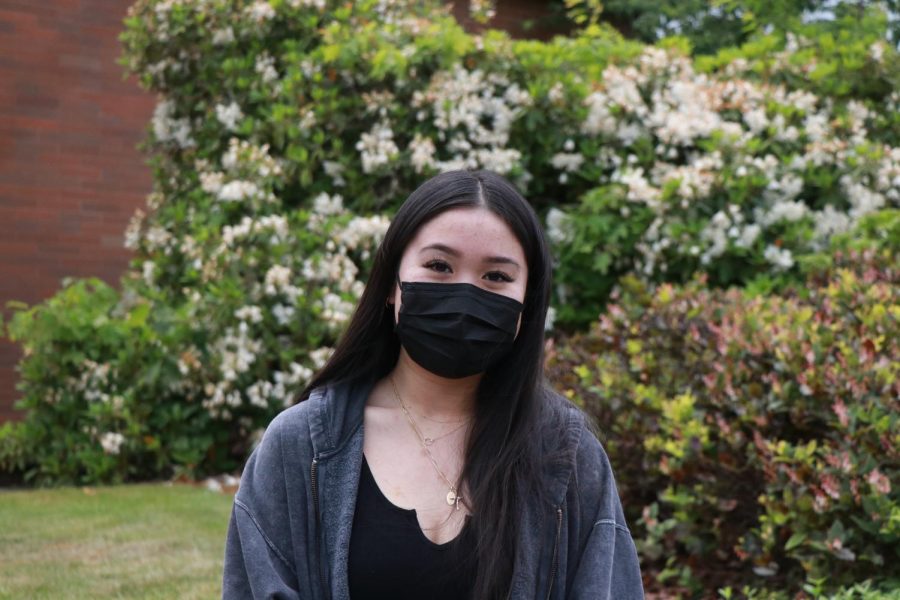
Danny said raising awareness through various forms of media can be helpful in shedding light on the achievements of people of color.
“I feel like stories of AAPI people are often suppressed, and often aren’t told [in] the mainstream media,” he said. “So for me, this month is really important because I really get to recognize people and celebrate my culture and celebrate the achievements that we have made so far.”
The club has also opened a pop-up thrift store selling used clothes donated by La Salle students and families. The shop opened on Monday, May 17, and will remain open through the end of this week after school in the La Salle Center courtyard. All proceeds will be donated to an organization that works to combat anti-Asian hate, Danny said, with any extra clothing being donated to charity.
Other members of the AAPI community at La Salle are commemorating the month by reflecting on AAPI identity, and the history, traditions, and culture that accompany it.
“Asian Pacific Islander Month, to me, is about recognizing Asian Americans and Pacific Islanders, specifically in the U.S.,” junior Amanda Rivera said. “Because they do a lot in contributing and influencing America’s culture, and it’s really important to see how our world is really developed off of people of color, especially Asian immigrants.”
Amanda’s parents are immigrants themselves, with her father moving to the U.S. from Guam and her mother from the Philippines.
“It’s really important to see how far my own family has come, as Asian Americans living here in the U.S.,” Amanda said. “Asian American heritage, for me, is really important, especially because I like to commemorate my own family history.”
In addition to her family’s history, Amanda also feels it is important to learn about and reflect on Asian American history in general, including the racism, stereotypes, and violence that for decades have affected those of Asian heritage living in the Western World.
Examples of hate against Asian Americans, like the Japanese Internment Camps and the anti-Asian sentiment that laid their foundation, may seem to some like a fragment of America’s distant past. However, rates of violence against Asian Americans have risen over the past year, with many instances of anti-Asian hate stemming from an erroneous sense of blame for the coronavirus, egged on in part by the spread of terms like “Chinese virus.”
“I want people to understand our past history of racism, which isn’t really spoken about [a lot], but it happened,” Amanda said. “I really want the community to stand alongside us because we genuinely belong with everybody else in the United States.”
Sophomore Catie Tassinari, similarly to Amanda, sees AAPI Heritage Month as a time to “focus and celebrate and recognize the influence that Asian American and Pacific Islanders have had on our country as a whole,” Catie said. “I think that it’s a good thing to have this month to kind of just individually reflect and kind of look back, not necessarily the present, but also just the past of the history behind our country, or just personally to your life — how have people of Asian American descent or Pacific Islanders, how have they affected your life?”
Junior Mia McCaffrey said for her, AAPI Heritage Month is a time to reflect on her personal family history, and she celebrates the month with her extended family when they gather for dinner every Sunday during May.
Mia said she also appreciates that the La Salle community is celebrating AAPI Heritage Month, as well as the opportunity to be involved in the AAPI Club.
“It’s nice to be recognized,” Mia said. “Growing up in school, I didn’t hear much about the history of [Asian Americans and Pacific Islanders]… So, having La Salle acknowledge that means a lot… Just the club in general, that we have one, I think it’s a nice way to connect with other students of AAPI heritage.”
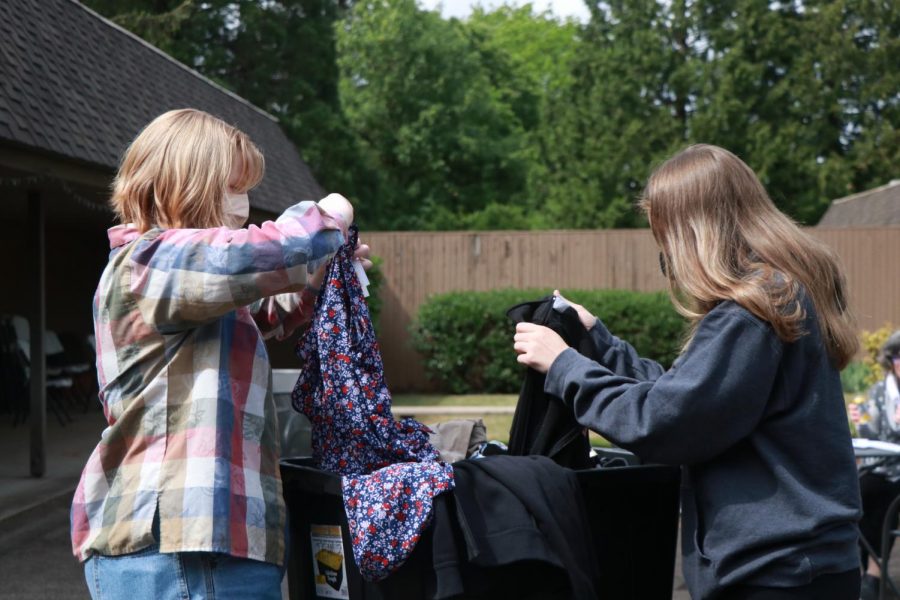
Amanda said that recognition of the AAPI community, its history, and its current culture is important for all people, not just those who are Asian American or Pacific Islander themselves.
“In the past, I feel like AAPI month hasn’t really been recognized and [it hasn’t] been that important to people who aren’t a part of our own community,” Amanda said. “It’s not really common for us to be recognized or spoken about — especially when it comes to racism, too, I feel like AAPI people are very pushed to the side, and it’s really disappointing.”
Amanda said she feels that Asian Americans are often left out of the conversation about racism and systemic prejudice.
“I feel like right now, our world is very white and black, so we’re not really focused on other people of color aside from the Black community — and that’s not a bad thing, because of how much racism they’ve experienced in the past and how severe their experiences have been,” she said. “But I just think the focus is very much white and black, regardless of the other people of color that are experiencing similar hate and violence.”
Mia said she feels it is important for all people of color to stand together.
“I don’t think that either community should be fighting for the spotlight,” Mia said. “Marginalized communities, since they have been oppressed the most, they’re kind of pinned against each other. I know a lot of people who think that it’s us against them, and I just think that we should be standing together rather than fighting.”
Senior Cameron Nguyen also described an intersection between the AAPI experience and the Black community, with the rise in anti-Asian violence coinciding with a year of racial reckoning and protests supporting justice for Black Americans.
“I think the recent rise in just calling out Asian American hate is definitely thanks to the recent Black Lives Matter movement,” Cameron said. “That definitely has roots in just calling out racial injustice. I think many Asians can just completely thank the Black community especially, and Black Lives Matter movement, for all they have done in terms of equality and support.”
Cameron noted the ways in which the Asian American experience differs from that of other minority groups in the U.S., citing the Model Minority Myth as a source of stereotyping, disrimination, and erasure of Asian Americans and Pacific Islanders.
“Asian Americans have struggles — of course, I am not comparing anyone’s struggles to anyone else’s, but there are still problems that many Asian Americans go through,” Cameron said. “I’m glad that with AAPI month, that can be seen and understood.”
The idea of the “model minority” is the widespread concept in which Asian Americans are seen as smarter, more successful, and more talented than other minorities in the U.S. The myth, based on stereotypes, characterizes Asian Americans as the “model” foreigners or immigrants who have worked hard enough to integrate themselves into American and Eurocentric culture, yet still remain outsiders of the white majority.
The Model Minority Myth was described by several AAPI-identifying students at La Salle as a form of racism against Asians, and is widely perceived as erasure of Asian American identity: It ignores the diversity within Asian cultures and heritage, generalizes all Asian Americans to be one and the same rather than recognizing individuality, and devalues the racial discrimination that Asian Americans do face.
Moreover, it places AAPI individuals into boxes that aren’t necessarily true or realistic, depreciating their individuality and steepening the ladder of expectations that minority groups must climb to reach the American ideal of individual prosperity bolstered by hard work and opportunity.
“It’s just a bit taxing to have such high expectations,” Cameron said. “And also, it feels really diminishing to the struggles that we do go through as Asian Americans.”
Alyna said that the Model Minority Myth has also been a way to use the AAPI community to suppress and discriminate against other racial groups.
“It’s basically Western society, American culture over here, just taking a racial group that they’re going to shape and basically put on this pedestal and tell other minority groups that, ‘Oh, if you work hard like this group, you’ll be able to achieve the same things,’” Alyna said. “But obviously that’s not true, because there’s systematic racism against other races… Even though Asians do have discrimination, it’s obviously not to the same degree as African Americans, so it’s basically just misinformation that because Asians are able to work hard, they’re able to achieve anything they want, which isn’t true, because other minorities don’t have access to the same thing.”
In the midst of a world of stereotypes and xenophobia against Asian Americans, Catie emphasized her appreciation of Asian culture and identity, as well as the opportunity that AAPI Heritage Month provides to celebrate the achievements of Asian Americans despite the discrimination they face.
“I think for me, it’s just a time to be really thankful for… the culture that I’ve grown up in,” Catie said. “When I was younger, I felt like everyone has the same culture, we all do these things, and it wasn’t until later that I realized [that] this is really specific to my family — like Chinese New Year, not everyone gets together to celebrate that holiday. I think that it’s just made me recognize… the diversity that we have.”
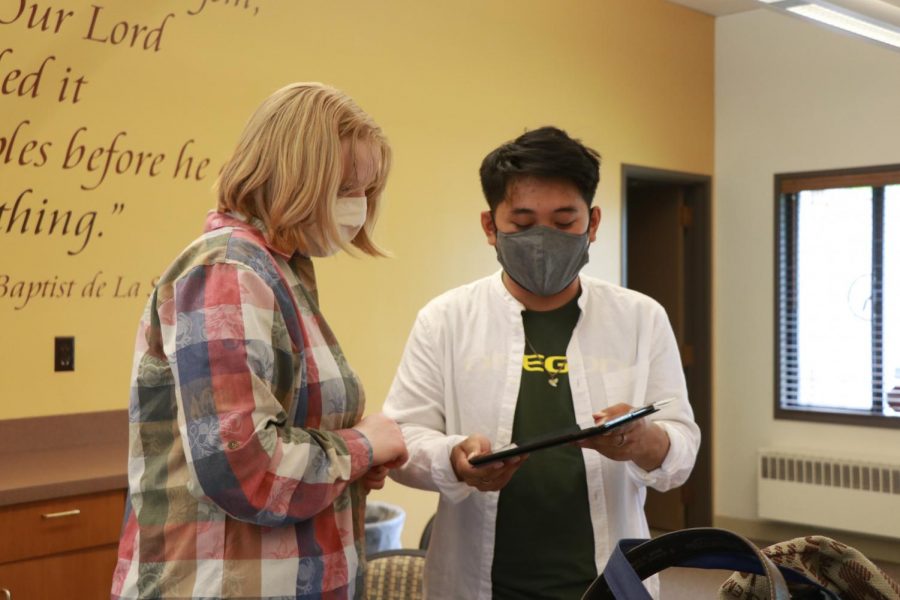
Junior Vinhson Nguyen said he has a different perspective on AAPI Heritage Month than others who he has talked to, expressing that he would rather continue to celebrate Lunar New Year and other Asian holidays and traditions than set aside a month to specifically recognize Asian Americans and Pacific Islanders.
“It makes it seem that it’s not part of the status quo already, and it doesn’t normalize it in a way that Asian identity is a part of American identity,” he said. “Asian history is part of American history, and I think we should be able to talk about these different cultures throughout the year. But it’s cool to have one month, I guess, but I think I would rather just be able to talk about it whenever we can.”
Vinhson said he feels it would be more meaningful to honor Asian culture and achievement by commemorating specific holidays or memorials, such as Lunar New Year or the liberation and reparations for Asian Americans who were persecuted in Japanese Internment Camps.
“I feel like in some ways, [the month is] kind of patting us on the head and telling us that we appreciate you guys, and so here’s this month, but American history is different from your history,” Vihnson said.
AAPI Heritage Month can feel more like checking a box than truly appreciating and recognizing Asian American identity and civil contributions, Vinhson said, and can restrict individuals to being defined exclusively by their ethnicity.
“Asian culture is such a broad spectrum of different countries,” he said. “I think being able to recognize a person’s individual story rather [than] a group story and categorizing them as a group, I think that serves better to understand a person’s culture and appreciate them.”
Though different students have varying views on the significance of AAPI Heritage Month, students expressed the importance of embracing culture and identity, as well as diversifying media representation and recognizing individuality.
“Self love is always important,” Danny said. “And having self love for your identity and your culture… is really a big part of it.”
Though he had not always appreciated his personal Asian American heritage, Danny said he now feels it is important to honor the contributions and advancements of the AAPI community.
“For me, this month is a really special month, because I think we often learn and recognize the values and importance of other people,” he said. “AAPI excellence and AAPI heritage should always be celebrated year round.”
Now, Danny no longer wishes he could wake up one day and be white. Rather than hoping to be white when he grows up, he hopes to become a doctor, looking to combat the biases and inequities that affect marginalized people in the healthcare system.
Looking back on his journey to appreciate his Asian identity, Danny recognized that he is not alone in his struggle to accept himself as a minority member in a majority white country. Though he has not always embraced his Asian heritage, Danny said that having increased Asian representation in the media and in those around him, as well as getting involved with the AAPI Club at La Salle, has helped him grow in his love for his culture and identity.
“I know a lot of people face these challenges, and so for me, I think having the month of May like this is a really great time for me to reflect back and see where I’ve gone,” he said. “I’ve definitely come to love and embrace my Asian experiences and culture that I have. And I’ve really come to accept a lot of it, because I really haven’t always done that.”


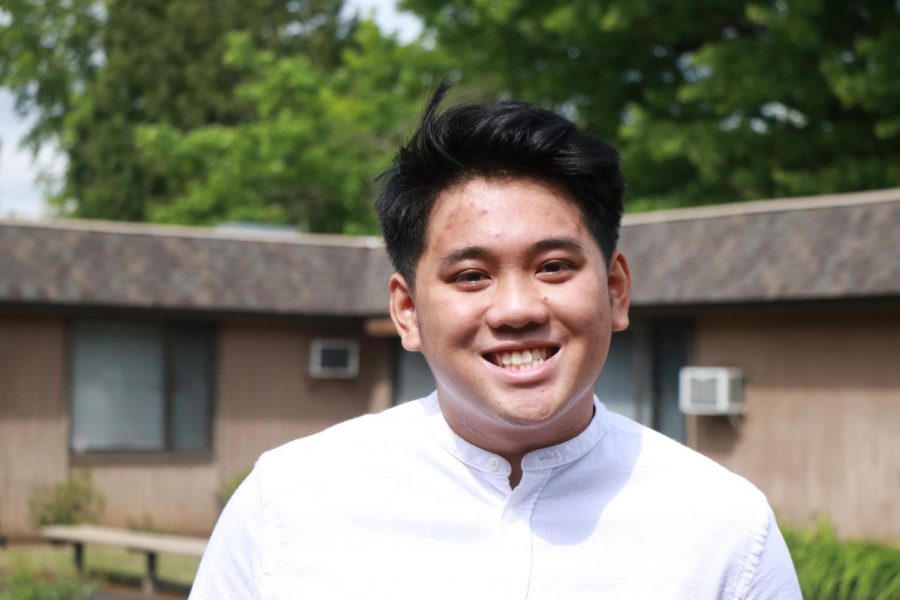
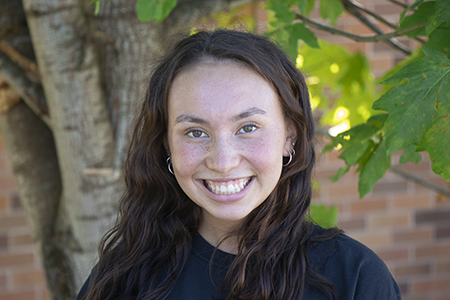



Chris Babinec • May 8, 2025 at 8:55 am
Fantastic coverage. So much appreciation for the students who share their personal stories and personal journeys in self love and cultural appreciation. I am also grateful for the spotlight on the model minority myth, the way people of different cultures are pitted against one another, the uptick in hate crimes against people with Asian heritage, especially during and after Covid, and the coverage of some of our nation’s shameful history.